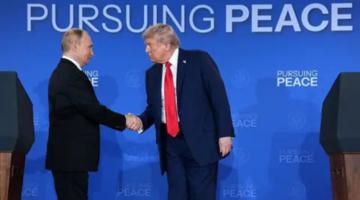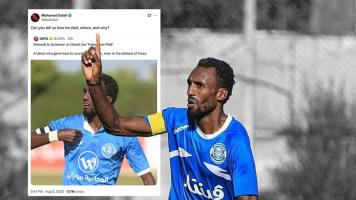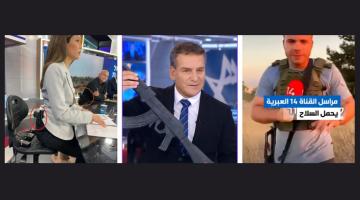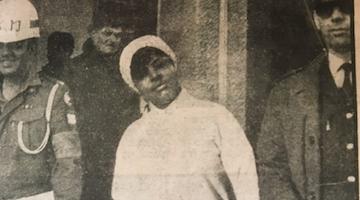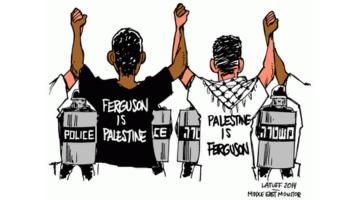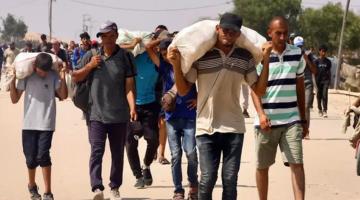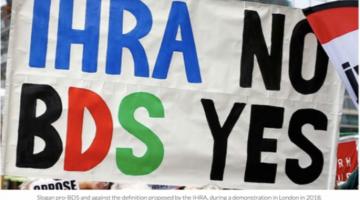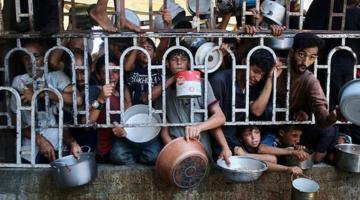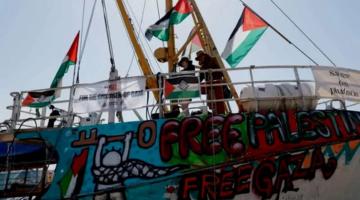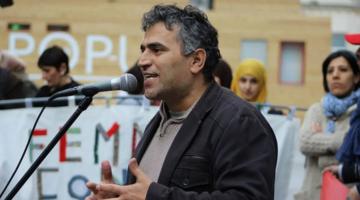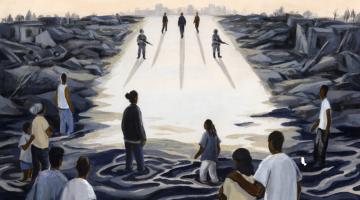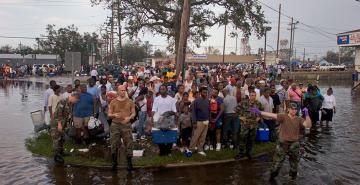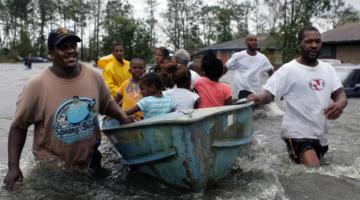Al Jazeera Arabic journalist Ismail al-Ghoul and cameraman Rami al-Rifi were killed in Gaza (Al Jazeera)
Israel's slaughter of media workers should ignite outrage and condemnation across the industry. But because they were Palestinian, the world looked away.
Originally published in Middle East Eye.
After 300 days of continuous coverage with my friend and companion Ismail al-Ghoul, I saw him without a head.”
These were the horrific words of Al Jazeera correspondent Anas al-Sharif, his eyes streaming and pain etched deeply on to his face after 10 months of covering the unspeakable crimes wrought on his people by Israel’s brutal genocide in Gaza.
His colleagues, correspondent Ghoul and camera operator Rami al-Rifi, were targeted by an Israeli drone while wearing their press gear and travelling in a car clearly marked as a news media vehicle.
Their slaughter, which Gaza’s government media office reported brought the number of Palestinian journalists killed by Israel since 7 October to 165, barely made a ripple in mainstream media.
Western journalists, many of whom profit and make their careers from covering our stories with thinly disguised opportunism and internalised racism, not only deny us the right to narrate, but they have also been nauseatingly silent over the industrial mass killing of their Palestinian counterparts.
Contrast this with the frenzy of coverage upon the Thursday release of Wall Street Journal reporter Evan Gershkovich from a Russian prison. Yet, the two beheaded Palestinian journalists scarcely registered as a blip on the western media’s radar, a damning indictment of the profession itself.
The lack of empathy for Palestinian journalists from international organisations has also been concerning, with weak statements that express “concern” or endless repetitions of the “journalism is not a crime” adage. This comes instead of genuine action to protect those risking their lives to report from Gaza or to actively reject the Israeli talking points that set the agenda for many newsrooms.
The statement from the Committee to Protect Journalists (CPJ) in response to the killing of Ghoul and Rifi is a classic example, expressing “dismay” and feebly calling on Israel to “explain why two more Al Jazeera journalists have been killed in what appears to be a direct strike”.
Racism and dehumanisation
As prominent journalist Laila al-Arian correctly points out, the only rationale for demanding an “explanation” from Israel on the killing of journalists doing their job is that Palestinians are assumed guilty and must prove their innocence, even in death, while Israel is repeatedly given the benefit of the doubt.
The complicit silence of international journalists suggests that they view their Palestinian counterparts as subhuman - as lesser beings, not worthy of life. Through this process of dehumanisation, Palestinian journalists are deemed untrustworthy to report on the crimes and violence meted out to them by a fanatical military power backed and aided by most western governments.
Follow Middle East Eye's live coverage of the Israel-Palestine war
We are too emotional, too close to the story and not to be taken seriously. I have faced such racist judgments from several editors I have had the displeasure of working with in newsrooms, while the ill-informed work of white British or American reporters was taken without question as the yardstick of editorial credibility.
Ghoul was the epitome of journalistic integrity. The 27-year-old carried out his duties without ever allowing his personal losses and painful sacrifices to impact his work.
His brother Khaled was killed in March during Israel’s raid of al-Shifa hospital; he was separated from his wife and young daughter, who were displaced to southern Gaza late last year; and he lost his cancer-stricken father, who managed to travel abroad for treatment but died in Qatar.
Nevertheless, his tone was always measured. He never offered anything more than a reproachful gaze towards his audience as he looked into the camera and narrated story after story from the besieged Gaza Strip.
Last March, Ghoul was briefly detained during the Israeli army’s raid and subsequent destruction of al-Shifa, in which hundreds of Palestinian civilians - including patients, doctors and displaced people - were killed.
More than a month later, Ghoul posted a light rebuke on social media, criticising the lack of protection and action by international media institutions concerning the arrests and abuses of journalists during the raid.
“No institution concerned with protecting journalists, locally or internationally, has contacted me to document the conditions of the arrest and who was arrested,” he wrote. “Is this the value of a journalist? Have we become just numbers in the records of these institutions and have they become fictitious names without any real content to protect us?”
Unwavering commitment
Much like doctors and medical personnel in Gaza, journalists in the enclave are also heroes, navigating the depths of hell to do their job. Facing hunger, a collapsed healthcare system and a lack of electricity, they have shown an unwavering commitment to a profession that has turned its back on them.
Under the threat of Israel killing their family members, Palestinian journalists dodge US-supplied missiles and bullets. Their press helmets and flak jackets serve as targets for Israel’s killing machine, which appears hellbent on ending the lives of witnesses to its crimes.
As Hani Mahmoud, another Al Jazeera correspondent in Gaza, astutely noted: “The vests that we are wearing are not protecting us.”
Palestinian journalists take their work seriously. In this unjust world, they speak truth to power in a war of narratives that deem them unworthy of life. The Guardian’s Nesrine Malik recently wrote of “necropolitics”, coined by historian Achille Mbembe, which refers to the wielding of power to determine who lives and who dies. This leads to the creation of “deathworlds”, where vast populations are subjected to living conditions that effectively render them the living dead.
In these dystopian times, it is the living dead who are rendered as the barbarians, while Israel - in all its destructive glory - invites comparisons to the “children of light”.
Speaking truth to power is the basis of journalism, something many of its professionals seem to have forgotten or willfully ignored in exchange for careerist goals. As the incessant buzzing of an Israeli drone filled the sky, Jihad al-Ghoul said this of his brother Ismail in a televised interview: “He was a conveyor of truth and a hero that stood steadfast in northern Gaza until his martyrdom.”
When asked for his message to the world, Jihad scoffed: “What world? The one that is not moved by the ongoing massacres? If a civilian is wearing a press jacket in a media vehicle that everyone knows belongs to Al Jazeera and is directly targeted… what world?”
The ongoing killing of Palestinian journalists will not deter those still alive. They understand their enemy very well and, against all odds, have been raised to view themselves as deserving of life despite the constant vitriol against them. The slaughter of Ghoul and Rifi, the latest in a long line of journalists killed simply for conveying the gut-wrenching realities of Israeli crimes against humanity, will strengthen their colleagues' resolve.
As Sharif said after burying his two companions: “We will not stop for one moment from conveying the suffering of our people and the Israeli occupation crimes. We will continue with our coverage despite being targeted, the continuing missile attacks, and lack of international protection.”
In one of his final posts on X, Ghoul similarly wrote: “The genocide continues, and so does our coverage. We remain on the ground, ready to bring the news first. We won’t stop, no matter how exhausted our bodies or weary our spirits. We persist in delivering the truth to ensure ongoing coverage from the heart of the events.”
The views expressed in this article belong to the author and do not necessarily reflect the editorial policy of Middle East Eye.
Linah Alsaafin is a Palestinian journalist who has written for Al Jazeera, The Times Literary Supplement, Al Monitor, The News Internationalist, Open Democracy and Middle East Eye.

